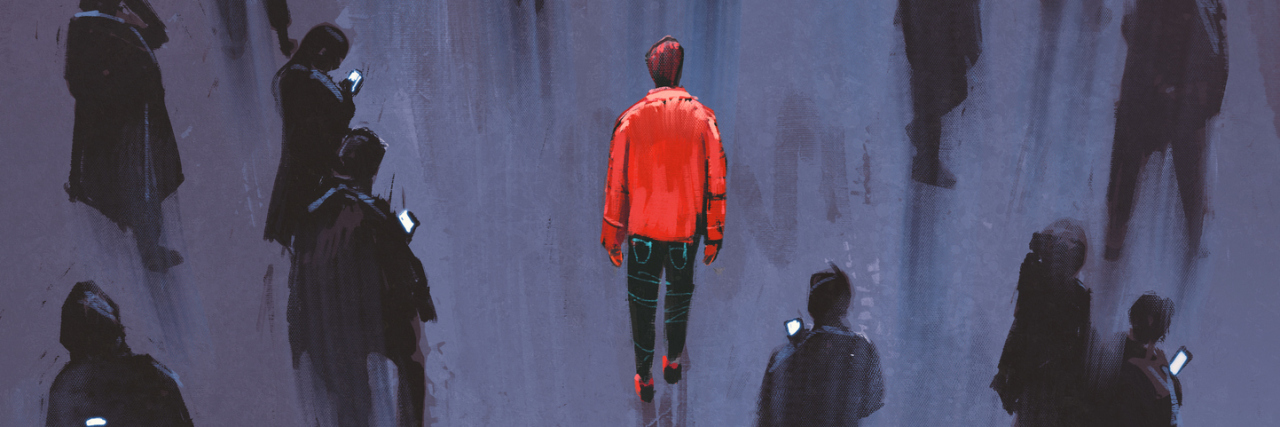I don’t want to be known only as the “sick girl,” but I also can’t pretend to be the picture of health. Many days, it feels as if I’m forced to choose between being seen as either a “fake” or a “freak.”
• What is Ehlers-Danlos Syndrome?
• What Are Common Ehlers-Danlos Syndrome Symptoms?
I saw family in the last week that I haven’t seen in years. We caught up, talked, laughed, prayed together and ate together. They didn’t know hardly anything about my struggles. I’ve kept it mostly under wraps, because I really had no idea how to tell them. I didn’t want to be remembered as the “sick one,” yet by saying nothing, I was maintaining a mask.
That’s just it. How do you explain what it’s like to have bone-crushing fatigue and pain that never lets up? How do you put into words what being mocked, invalidated and refused help by dozens of doctors feels like to a person who hasn’t ever heard of such a thing, let alone experienced it?
Words wouldn’t come, and when they did, they didn’t capture what I wanted to convey. I’m much less eloquent when I speak than when I write. I often struggle to find even simple words when brain fog hits. They meant well – more than that, they seemed to want to understand. There was kindness in their eyes.
Yet, they didn’t get it.
How could they? How could I expect them to?
Even now, I’m frustrated by my inability to articulate.
When they ask if it “aches like the flu,” how do you explain nicely that the pain you go through is nothing like normal people sickness – that it’s much more severe and never ends? How do you get this across without sounding like you’re trying to somehow brag about your illness or one-up their experiences?
That’s what I’m trying to figure out.
The problem is that I still ache to be understood.
The second conversation where health came up didn’t go badly, but it ate at me. I could tell they were unsure what to say to me. They couldn’t relate. (It would be unfair of me to expect them to.)
They’re never going to believe you. They think you’re making it up. Why didn’t you just sit quietly and listen? Why did you have to say all that? my mind accused.
Even though my family was kind, my brain relied on past scenarios and decided it was time to full-out panic. My sister, mother and I returned to our own separate hotel room. I hadn’t gotten to rest for two days. I’d walked more than my body could handle. I was at a boiling point. Now that no one could see me, I fell apart. The words came tumbling out.
I distinctly remember saying, “I feel like a freaking alien!”
Writing it out now, it sounds kind of funny, but at the time, I meant every word.
The conversation I’d had brought back torrents of memories of the past six years. Every single time I muster the strength to explain my chronic pain, I am met with doubt or outright hostility at worst and misunderstanding at best. It is predictable, yet never any less painful. Each time, I wonder why I open myself up, only to be reminded that I am, in fact, somewhat of a “freak.”
“I just want to be normal,” I said.
It sounds like stereotypical teenage angst, but ironically, it has nothing to do with what the average teenager goes through.
That is what it boils down to. I do not want to stick out. I do not want to have to be helped or assisted. I do not want to be in the spotlight. I want to be able to go where everyone else goes and do what everyone else does. I want to blend in, fit in and be left alone.
That is why I am so enraged when people imply that chronically ill people just want attention. Trust me, you do not want this kind of attention. Not at all. I don’t want this. I never did. Who would?
I know many of you might be thinking: if my illness is not my identity, and I don’t want to be known as the “sick girl,” why do I constantly post about chronic illness? Isn’t that counter-intuitive?
I have put a lot of thought into this recently. The answer is simple: to tell others what I wish someone had told me. I want to reassure them that chronic illness is not the end of your life. It is only a shift, an new direction – a painful one, to be sure – but with joy to be found along the way. There is hope when you least expect it.
In the end, there is nothing more soul-crushing than constantly pretending to be something you’re not. I can’t live in fear of other’s opinions, constantly hiding. I will not be understood, and I’m beginning to see that’s OK. If I rely on other people’s validation about my health, I will constantly be disappointed and broken up about it. That’s no way to live.
For me, the conclusion is clear:
Out with the “fake,” in with the “freak.”
Getty Image by Grandfailure

